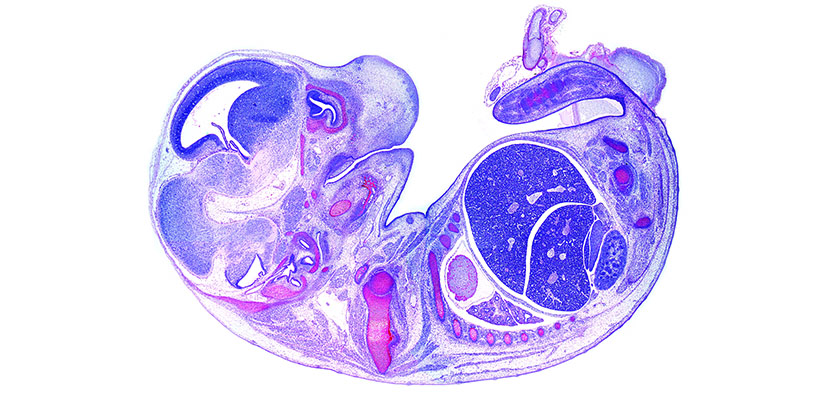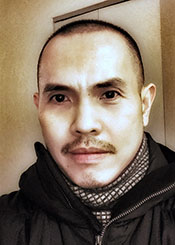Mouse Histology & Phenotyping Laboratory

The Mouse Histology & Phenotyping Laboratory (MHPL) offers standard and customized research-specific histology and molecular phenotyping services. Its comprehensive histopathology services are available for a wide variety of cells, organs, tissues including organoids and xenografts derived from different species of experimental animal models (e.g., mouse, rat, primates, pigs, ferrets, dogs, zebrafish). Consultations in developmental biology and pathology are also available to help develop strategies to elucidate physiologic functions of genes and proteins, to validate novel therapeutic strategies and surgical procedures, to assess immune response in diseases and their treatments, and to assess drug efficacy and/or toxicity. The MHPL is a vital and cost-saving resource for life and biomedical scientists that utilize experimental animal models in their research. While most of its clientele are largely researchers affiliated with Northwestern University, the MHPL has also helped researchers from the Chicago Biomedical Consortium, other academic institutions, and biotech companies.
Contact Us
Location
- Olson Pavilion, 8-333 & 8-335
710 N. Fairbanks Court
Chicago, IL 60611
Website
Services & Equipment
Key Services
- Tissue Processing and Embedding
- Microtomy (paraffin, cryostat/frozen, and vibratome sectioning)
- RNAse-free microtomy for In Situ Hybridization (ISH) and spatial genomics
- Cryostat and vibratome training
- Routine histology stains (H&E, MTC, PAS)
- Specialty histology stains (ORO, van Gieson, Alcian blue, reticulin, Prussian Blue, Nissl and many others)
- Chromogenic Immunohistochemistry (IHC) – single or duplex
- Antibody Work-ups and Validations
- Cell Death & Apoptosis Assay (TUNEL Assay or Cleaved Caspase 3 IHC)
- Enzyme Histochemistry and Lectin Stains (e.g., b-gal, GS-IB4, LTL, TEL, UEAI, ConA, WGA)
- Multiplex Immunofluorescence (IF) - classical and tyramide signal amplification (TSA) methods
- Whole-mount (organoid or vibratome thick sections) and cell/tissue culture multiplex immunofluorescence
- Nucleic Acid In Situ Hybridization (ISH) Assays (RNAscope, miRNAscope, RNAscope Plus, DNAscope) – chromogenic and multiplex fluorescent
- Fluorescent Protein-Nucleic Acid Co-Detections (Multiplex IHC/IF Plus ISH/RNAscope)
- Optical clearing of whole organs and tissues through X-CLARITY
- Consultations: dissections and necropsy methods; histology stains and molecular phenotyping; developmental biology and genetics; design of animal protocols
- Professional pathology assessments, phenotype scoring and toxicity evaluation
Equipment
- Leica ASP300S Tissue Processor
- Sakura Tissue-Tek VIP6 Tissue Processor
- Leica EG1160 Embedding Center
- Rotary Microtomes (Microm HM 325; Microm HM355S)
- Leica CM1850UV Cryostat
- Leica VT1200S Vibratome
- PrintMate AS Tissue Cassette Printer
- Primera Signature Slide Printer
- Biocare IntelliPATH FLX Automated Immunohistochemistry Systems
- Leica Autostainer XL Automated Histology Stainer
- Leica CV5030 Automated Glass Coverslipper
- Leica MZ95 Stereo Microscope
- Olympus BX41 Epifluorescence Microscope
- LOGOS X-CLARITY Tissue Clearing System
Highlighted Projects
- Bui TM, Yalom LK, Ning E, Urbanczyk JM, Ren X, Herrnreiter CJ, Disario JA, Wray B, Schipma MJ, Velichko YS, Sullivan DP, Abe K, Lauberth SM, Yang GY, Dulai PS, Hanauer SB, Sumagin R. Tissue-specific reprogramming leads to angiogenic neutrophil specialization and tumor vascularization in colorectal cancer. J Clin Invest. 2024 Apr 1;134(7):e174545. doi: 10.1172/JCI174545. PMID: 38329810; PMCID: PMC10977994
- Garcia J, Daniels J, Lee Y, Zhu I, Cheng K, Liu Q, Goodman D, Burnett C, Law C, Thienpont C, Alavi J, Azimi C, Montgomery G, Roybal KT, Choi J. Naturally occurring T cell mutations enhance engineered T cell therapies. 2024 Feb;626(7999):626-634. doi: 10.1038/s41586-024-07018-7. Epub 2024 Feb 7. PMID: 38326614.
- Han S, Lee M, Shin Y, Giovanni R, Chakrabarty RP, Herrerias MM, Dada LA, Flozak AS, Reyfman PA, Khuder B, Reczek CR, Gao L, Lopéz-Barneo J, Gottardi CJ, Budinger GRS, Chandel NS. Mitochondrial integrated stress response controls lung epithelial cell fate. 2023 Aug;620(7975):890-897. doi: 10.1038/s41586-023-06423-8. Epub 2023 Aug 9. PMID: 37558881; PMCID: PMC10447247.
- Li S, Lu D, Li S, Liu J, Xu Y, Yan Y, Rodriguez JZ, Bai H, Avila R, Kang S, Ni X, Luan H, Guo H, Bai W, Wu C, Zhou X, Hu Z, Pet MA, Hammill CW, MacEwan MR, Ray WZ, Huang Y, Rogers JA. Bioresorbable, wireless, passive sensors for continuous pH measurements and early detection of gastric leakage. Sci Adv. 2024 Apr 19;10(16):eadj0268. doi: 10.1126/sciadv.adj0268. Epub 2024 Apr 19. PMID: 38640247; PMCID: PMC11029800.
- Rashidi A, Billingham LK, Zolp A, Chia TY, Silvers C, Katz JL, Park CH, Delay S, Boland L, Geng Y, Markwell SM, Dmello C, Arrieta VA, Zilinger K, Jacob IM, Lopez-Rosas A, Hou D, Castro B, Steffens AM, McCortney K, Walshon JP, Flowers MS, Lin H, Wang H, Zhao J, Sonabend A, Zhang P, Ahmed AU, Brat DJ, Heiland DH, Lee-Chang C, Lesniak MS, Chandel NS, Miska J. Myeloid cell-derived creatine in the hypoxic niche promotes glioblastoma growth. Cell Metab. 2024 Jan 2;36(1):62-77.e8. doi: 10.1016/j.cmet.2023.11.013. Epub 2023 Dec 21. PMID: 38134929; PMCID: PMC10842612.
- Weidemann BJ, Marcheva B, Kobayashi M, Omura C, Newman MV, Kobayashi Y, Waldeck NJ, Perelis M, Lantier L, McGuinness OP, Ramsey KM, Stein RW, Bass J. Repression of latent NF-κB enhancers by PDX1 regulates β cell functional heterogeneity. Cell Metab. 2024 Jan 2;36(1):90-102.e7. doi: 10.1016/j.cmet.2023.11.018. PMID: 38171340; PMCID: PMC10793877.
- Zhang P, Rashidi A, Zhao J, Silvers C, Wang H, Castro B, Ellingwood A, Han Y, Lopez-Rosas A, Zannikou M, Dmello C, Levine R, Xiao T, Cordero A, Sonabend AM, Balyasnikova IV, Lee-Chang C, Miska J, Lesniak MS. STING agonist-loaded, CD47/PD-L1-targeting nanoparticles potentiate antitumor immunity and radiotherapy for glioblastoma. Nat Commun. 2023 Mar 23;14(1):1610. doi: 10.1038/s41467-023-37328-9. PMID: 36959214; PMCID: PMC10036562
Acknowledgement
Format for the acknowledgment
Histology services were provided by the Mouse Histology & Phenotyping Laboratory of Northwestern University, which is supported by NCI P30-CA060553 awarded to the Robert H. Lurie Comprehensive Cancer Center.
Why acknowledge us
Acknowledgements provide us with visible measure of the impact of MHPL and help us obtain financial supports through grants so that we may continue to provide our key services in the best ways possible.
When to acknowledge
- Anytime the MHPL provides services that support your research
- If an MHPL staff has made significant intellectual contribution beyond routine sample analysis, please consider an authorship. Authorship is essential for the professional development of our staff and also help in securing funding for MHPL.
Where to acknowledge
- Original Research Papers, Manuscripts and Publications
- Posters
- Presentations
- Scholarly Reports
- Grants
Core Navigator
 For guidance on which cores may be most useful for your research and to coordinate use, please use the AI-powered Core Navigator chatbot, use the information request form or contact Sara Fernandez Dunne at s-fernandez@northwestern.edu or 847.491.5960.
For guidance on which cores may be most useful for your research and to coordinate use, please use the AI-powered Core Navigator chatbot, use the information request form or contact Sara Fernandez Dunne at s-fernandez@northwestern.edu or 847.491.5960.

